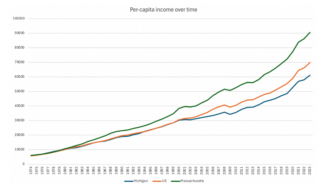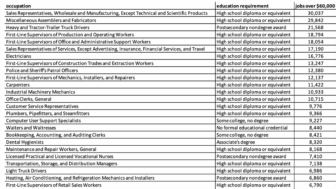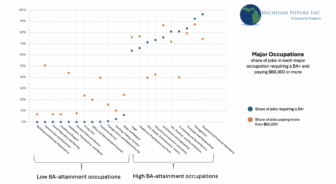
The pandemic is hardening our two-tier economy. One where those at the top are doing well, but way too many Michiganders are struggling.
Low-wage workers have suffered the most since the onset of the pandemic and the forecast is that reality will last for years. This repeats the experience during and after the Great Recession.
The University of Michigan’s Research Seminar in Quantitative Economics in their The Michigan Economic Outlook For 2021–2022 detail that employment in low-wage industries initially fell to 70 percent of their pre-pandemic level and project that employment at the end of 2022 in those low-wage industries will only be 92 percent of their pre-pandemic levels.
That compares to employment in middle-wage industries initially falling to 85 percent of pre-pandemic levels and recovering to 98 percent by the end of 2022. Employment in high-wage industries initially falling to 89 percent of pre-pandemic levels and recovering to 101 percent by the end of 2022.
Prior to the pandemic 43 percent of Michigan households were unable to pay for basic necessities. That despite an economy that many described as one of the best ever. Characterized by low unemployment, decent economic growth and record profits and stock market valuations.
The 2019 Michigan economy wasn’t one of our best ever. It was a two-tier economy. There is no such thing as a good economy when four and ten households (1.6 million Michigan households––many with working adults) cannot pay for basic necessities. As is now clear, far too many of our families pre-pamdemic had not been succeeding for far too many years. If they are not succeeding, our state is not succeeding.
The preeminent reason for our two-tier economy is that the economy is producing way too many low-wage jobs. 60 percent of Michigan jobs pay less than $20 and hour.
This is structural. We are not growing our way out of too many low-wage jobs. Lots of businesses that employ lots of people have business models based on low-wage workers.
The pandemic has made crystal clear that there simply are lots of tasks that need to get done that are structurally low-wage work. Everyday, in every community in Michigan, we are confronted with the vast number of low-wage workers in the leisure, hospitality and personal services industries who have lost their jobs and no longer can make ends meet. As well as those who get us food and prescription drugs and who care for us who are not only putting their lives on the line to serve us but also are struggling to pay for the necessities.
They live paycheck to paycheck not because they are irresponsibly buying “unnecessary” luxuries, but because they are in low-wage jobs that leaves them struggling to pay for the necessities. The reality is that a vast majority of those struggling economically and without an adequate safety net to deal with emergencies are hard working Michiganders. Who like us get up every day and work hard to earn a living.
That the prime reason for so many struggling is not irresponsible adults coddled by a too-generous public safety net, but rather an economy, even when it is booming, has too few jobs that pay family-sustaining wages and provides health coverage and paid leave.
The prime economic challenge of our times is having an economy that provides family-sustaining jobs––not just any job––so that all working Michigan households can raise a family and pass on a better opportunity to their children.
We can––and should––debate how to achieve an economy that benefits all. What we should not and cannot ignore is that our economy structurally is leaving too many behind. The first step in solving this problem is to recognize that this a problem that will not be fixed when the economy starts to grow again. The second step is to change our definition of economic success from a low unemployment rate to a rising household income for all. And then get to work on developing a bipartisan agenda to achieve that mission.







